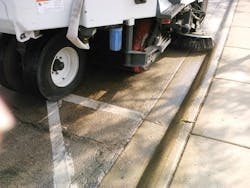About the author: Renee Lee is associate editor for Storm Water Solutions. Lee can be reached at [email protected].
Street cleaning is a duty of local government that many residents may take for granted. But without it, however, streets would be left cluttered with debris and leaves, especially in the fall.
Keeping it Clean in Illinois
Virtually every municipality has its own streets and sanitation department to handle street sweeping. The village of Glencoe, Ill., a northern suburb of Chicago, is home to approximately 8,700 people, according to the 2010 U.S. Census. A streets crew, under the leadership of supervisor Ray Irby, maintains 75 miles of street-lanes and 70 miles of sidewalks.
Irby and his crew divide the village into several zones, separating the commercial district from residential areas. The commercial zone is swept first, and the goal is to finish a complete rotation of zones in a week.
The crew’s Elgin Pelican sweeper starts moving through town at 5:30 every morning and continues until around 7 a.m. The best time of the year to sweep, Irby said, is in the spring and early summer. Leaves keep the machine busy in the fall, and sweeping ultimately stops once winter approaches.
When it comes to sweeping, questions arise about how to prevent debris from running off into storm water basins. It has not been much of a problem for Glencoe, though, Irby said. The village’s sweeper only sets down enough water to gently lift debris off the streets; therefore, not much water is pulled from the catch basins, which eliminates the complications of having to prevent or deal with pollutant runoff.
All departments have felt the pinch of budgeting cuts, Irby said, but so far they have been able to stay on budget to keep materials and staff on track.
The village typically restricts parking to one side of the street, so keeping cars out of the way of sweepers is not much of an issue. Most residents park their cars in their driveways, Irby said.
Irby has been with the crew since 1990, and along the way has determined some best management practices for street cleaning—one of which is to continually educate and train his crew.
“I really rely on the experience of our operators,” he said. “I believe in stressing safety and education to make sure people are versed in the latest and greatest tools and techniques.”
The staff of approximately 20 people receives extensive cross-training in the different divisions of public works. Many of the employees have more than 20 years of experience to date; one operator is approaching his 41st year.
Manufacturers Weigh In
Terry Parsons, the West Coast regional sales manager for Schwarze, a street cleaning company based in Huntsville, Ala., knows quite well the challenges his customers face.
Mandates on storm water acts have changed so much recently, Parsons said, that customers are having trouble staying current on the requirements.
According to Parsons, many municipalities—especially the smaller ones—have older equipment that they might not have the budgetary resources to update.
“When it comes down to it, you have to pick the debris up off the streets,” Parsons said. “It's like cleaning your house—you need a regimen and you need to stick to it.”
Brian Giles, sweeper products manager for Elgin Sweepers, a company offering sweepers for municipal, industrial and contractor jobs based in Elgin, Ill., emphasized sweeping frequency over sweeper efficiency.
A standard sweeper, Giles said, has about an 85% efficiency rate, and others can go up to 95%. Sweeping twice a week with 85% efficiency goes further than sweeping once a week at a higher rate.
“It comes down to the housekeeping,” Giles said. “The most cost-effective way is to sweep early and often.”
The cost of simply sweeping debris off the ground, compared with the cost of cleaning debris out of the catch basins, compared with cleaning sewer water, has a relationship of close to one, 10 and 100 times more expensive as you go through the steps, Giles said, meaning that it is far less expensive to keep streets clean than
it is to let debris progress all the way to sewers.
Giles said his customers are feeling increasing pressure due to funding cuts. While the number of machines is not a problem for many municipalities, paying staff is—illuminating another reason that governments and municipalities need to get creative with how they find funding: People’s jobs are depending on it.
Download: Here
